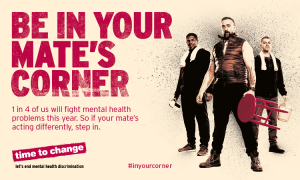‘Time to change’ is a movement working to change the way people think and act about mental illness. They have released an advert ‘be in your mate’s corner’ where a man who is struggling with mental health issues is supported by some friends. This advert works to normalize the discussion of men’s mental health and encourage friends to support those who are suffering.
Michela Clarke
EDIT Lab placement student
But is there really a problem with men’s mental health?
After some research (which included looking back at previous blog posts from Thalia [Eley, EDIT Lab director], Alicia [Peel, EDIT Lab placement student] and Yasmin [Ahmadzadeh, EDIT Lab PhD student]) I discovered that the answer is yes.
Half of men with diagnosable psychiatric disorders receive no formal assistance or even informal assistance (Addis, 2011). There has also been a pattern of decreased social support networks for men. Research shows that in early life men are close to their friends, but lose these friendships as they grow older. As a result they have fewer informal outlets to discuss their issues (Way, 2013).
But aren’t women more likely to have a mental health problem?
Although women are more likely to be diagnosed with a mental health problem than men, these differences disappear when we consider factors such as racial-ethnic group (Piccinelli & Wilkinson, 2000). The differences in appearance of symptoms for anxiety and depression across genders also result in men being under-diagnosed for many mental health issues (Connell & Messerschmitt, 2005).
Furthermore, there is a gender difference in help-seeking behaviours in men and women, with men seeking less help than women (Seidler et al., 2015). Men are also less likely to disclose abuse. One group of researchers have found that only 50% of men disclose abuse in their lifetime compared to 70% of women (Ullman & Filupas, 2005).
How can we explain the differences in women and men’s mental health?
Researchers have suggested that social and environmental factors explain the gender gap in mental health better than biological factors (Addis & Mahalik, 2003). Factors such as unstable employment, daily stress and low self-esteem are strongly associated with mental health problems in men. Additionally, the masculine norms embedded in society can leave men feeling under pressure to be self-reliant, problem free, strong, brave and emotionless (Addis, 2008) – thereby preventing men from seeking help.
What are the consequences of poor mental health in men?
The consequences of poor mental health in men can be severe. For example, depression in men can have fatal consequences – with men being four times more likely to be successful at suicide than women (Addis, 2008). Furthermore, males suffering from mental health issues are more likely to be violent and abusive to their intimate partners than males with good mental health (Acevedo, Lowe, Griffin & Botvin, 2013).
So what can we do about all these issues?
- Issues 1: Men struggling with mental health have less support.
- We need to support men more when they are struggling (through movements like the ‘time to change’ campaign)
- Issues 2: Men are under-diagnosed and less likely to seek help for a mental health issue.
- We need to change the way we diagnose mental health in men and make men feel more comfortable in disclosing their experiences.
- Issues 3: Social factors can explain the mental health gap between men and women.
- As a society we need to recognize and address the factors that are preventing men from seeking help. By learning to identify the factors that encourage men to seek help (Seidler et al., 2015 gives a good summary of this) we can strive to make mental health services more accessible to men.
- Issue 4: The consequences of poor mental health among males are far reaching
- This isn’t just about the fatal consequences for men, but it is also important for people connected to them. It is in everyone’s best interest to get involved in helping to improve mental health within our society.
So to answer the original question:
Is the ‘time to change’ campaign necessary for men’s mental health?
YES.
For more reasons why, see the ‘time to change’ website: here




[…] the training room, was that we were all women (see Michela’s [Clarke, EDIT Lab placement student] blog post from earlier this week for more information on why this is not surprising, but is very […]